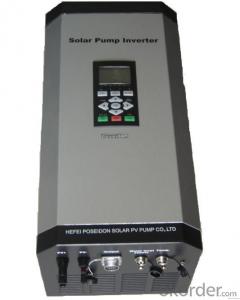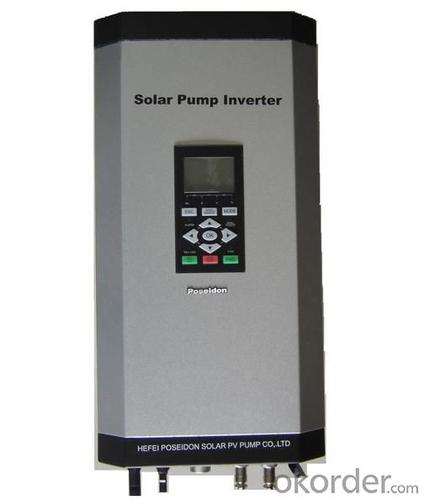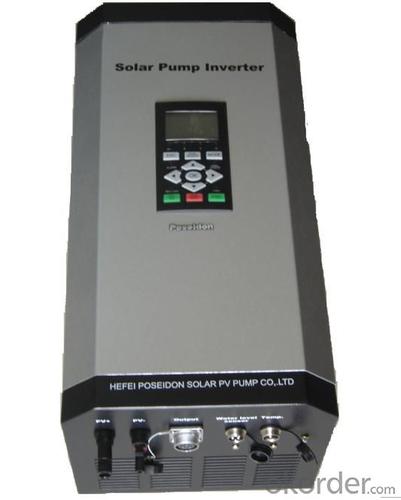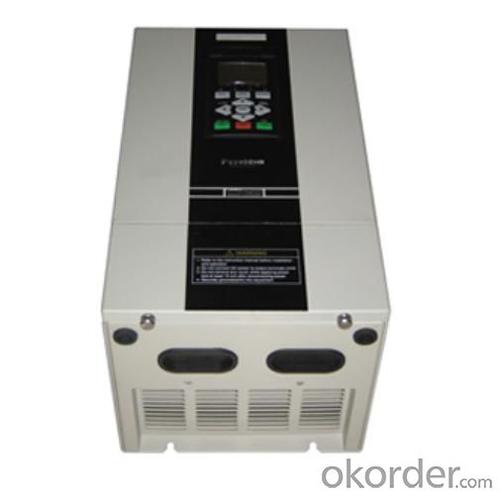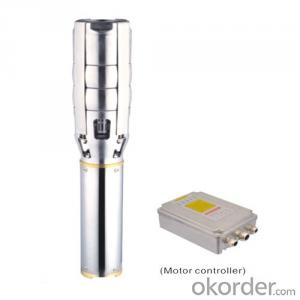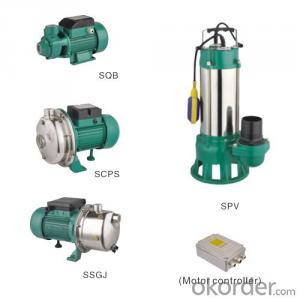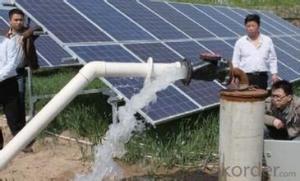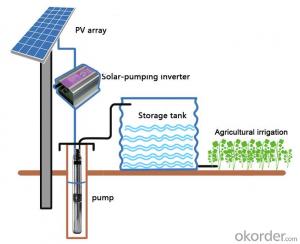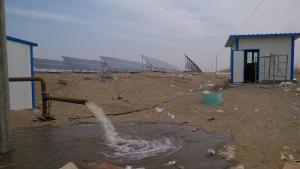Garden Pond Solar Pump FCPM9KH Inverter
- Loading Port:
- China Main Port
- Payment Terms:
- TT OR LC
- Min Order Qty:
- -
- Supply Capability:
- -
OKorder Service Pledge
Quality Product, Order Online Tracking, Timely Delivery
OKorder Financial Service
Credit Rating, Credit Services, Credit Purchasing
You Might Also Like
Solar pump inverter FCPM9KH Product Description:
Product Description:
Solar water pumping system is constructed with solar panel array,solar pump inverter and AC water pump, DC current produced from solar panel will be delivered to solar pump inverter,and it will convert it into AC current to drive water pump,and will automatically regulate output frequency according to sun radiance intensity,maximally realize MPPT tracking function.
Product Features
Adopting the proposed dynamic VI maximum power point tracking (MPPT) control method, with fast response, and reliable operation, achieves efficiency of 99%.
Designed with variable frequency driver, greatly improves efficiency
Extremely high efficiency
Digital mode control, with automatic operation and manual operation mode options
Complete protection functions
Adopts intelligent IPM module, with high reliability
LCD display and operation panel, in real time presents operating data
Optional for water level measurement and control circuit
Applicable for general ACC pumps, like centrifugal pump, piston pump etc.
Independent intellectual property; Highly effective, the redundant reliability, exempts the maintenance and the long life.
The pumps are soft started, fully protected.
No batteries are used. So better Sunlight, more water
Datasheet.
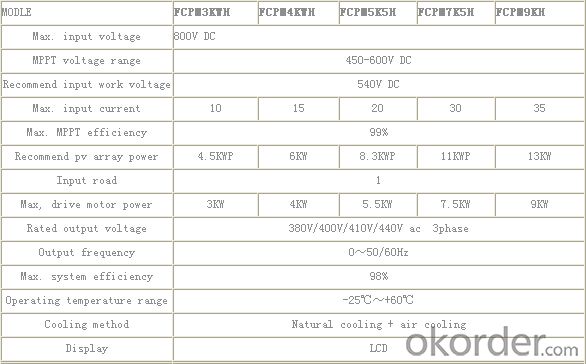
- Q: Can a solar pump be used in areas with limited access to water storage tanks?
- Yes, a solar pump can be used in areas with limited access to water storage tanks. Solar pumps are designed to directly pump water from sources such as wells, rivers, or lakes, eliminating the need for water storage tanks. These pumps use solar energy to power the pumping mechanism, making them suitable for remote locations without access to electricity.
- Q: What is the typical power consumption of a solar pump?
- The typical power consumption of a solar pump depends on various factors, such as the size and efficiency of the pump, the amount of sunlight available, and the desired flow rate. However, on average, a small solar pump can consume around 100 to 500 watts, while larger pumps may require several kilowatts of power.
- Q: Are solar pumps suitable for use in developing countries with limited access to electricity?
- Yes, solar pumps are highly suitable for use in developing countries with limited access to electricity. They provide a reliable and sustainable solution for accessing water resources without relying on traditional energy sources. Solar pumps can operate efficiently in remote areas, are cost-effective in the long run, and require minimal maintenance. They contribute to improving agricultural productivity, water supply for communities, and overall socio-economic development in such regions.
- Q: Can a solar pump be used for water supply in off-grid resorts?
- Certainly, the utilization of a solar pump for water supply in off-grid resorts is absolutely feasible. Such pumps present an ideal solution for off-grid locations due to their reliance on solar energy for operation, thereby eliminating the necessity for grid electricity. Moreover, they exhibit remarkable efficiency, cost-effectiveness, and environmental friendliness. The functioning of solar pumps revolves around the conversion of solar energy into electricity, which powers the pump responsible for drawing water from sources such as wells or boreholes. Consequently, this water can be stored in tanks or directly supplied to the resort for a myriad of purposes including drinking, irrigation, or swimming pools. The use of a solar pump for water supply in off-grid resorts offers numerous advantages. Firstly, it ensures a dependable and consistent water supply, even in remote areas where grid electricity might be inaccessible. Secondly, it reduces operational costs and dependence on generators fueled by fossil fuels, thereby providing a sustainable solution. In addition, solar pumps necessitate minimal maintenance and boast an extended lifespan, guaranteeing hassle-free operation for the resort. Furthermore, they are easily installable and customizable to cater to the specific water requirements of the resort, rendering them a flexible solution. All in all, a solar pump proves to be an exceptional choice for off-grid resorts seeking a sustainable and reliable water supply solution. Not only does it contribute to a reduction in carbon emissions, but it also offers a cost-effective and efficient alternative to conventional water pumping systems.
- Q: How does a solar pump handle water with high levels of chlorine or other disinfectants?
- A solar pump does not directly handle or treat water with high levels of chlorine or other disinfectants. Its main function is to draw water from a source, such as a well or reservoir, and pump it to its desired destination using solar energy. The water quality, including chlorine or disinfectant levels, is typically addressed by appropriate water treatment systems or processes downstream of the solar pump.
- Q: Is a solar pump easy to install?
- Yes, a solar pump is generally easy to install. It requires minimal wiring and can be set up without the need for complicated plumbing or external power sources. The simplicity of installation makes solar pumps a convenient and hassle-free option for pumping water using renewable energy.
- Q: Can a solar pump be used for agricultural applications?
- Yes, a solar pump can be used for agricultural applications. Solar pumps are an excellent alternative to traditional pumps that rely on fossil fuel-powered engines or electricity from the grid. They are particularly well-suited for agricultural use in areas with abundant sunlight and limited access to electricity. Solar pumps can be used for various agricultural applications such as irrigation, livestock watering, and water supply for crop spraying. They are highly efficient, cost-effective, and environmentally friendly. By harnessing solar energy, these pumps eliminate the need for expensive fuel or electricity, thus reducing operational costs for farmers. Furthermore, solar pumps provide a reliable and consistent water supply, ensuring that crops receive adequate irrigation even in remote or off-grid locations. They are easy to install, require minimal maintenance, and have a long lifespan, making them a practical solution for agricultural needs. In addition to these benefits, solar pumps contribute to sustainable farming practices by reducing carbon emissions and dependency on non-renewable energy sources. Farmers can also take advantage of government incentives and subsidies often available for adopting solar-powered equipment. In conclusion, a solar pump is an excellent choice for agricultural applications due to its efficiency, cost-effectiveness, reliability, and environmental advantages. It promotes sustainable farming practices and offers a viable solution for farmers in areas with limited access to electricity or high fuel costs.
- Q: What are the different types of solar pumps available?
- There are mainly three types of solar pumps available: submersible solar pumps, surface solar pumps, and floating solar pumps. Submersible solar pumps are installed underwater and are commonly used for deep wells or boreholes. Surface solar pumps are placed on the ground and are suitable for shallow wells or water bodies. Floating solar pumps are designed to float on water and are used for irrigation in ponds or reservoirs.
- Q: What is the expected lifespan of the controller used in a solar pump system?
- The expected lifespan of a controller used in a solar pump system can vary depending on various factors such as the quality of the controller, usage patterns, maintenance, and environmental conditions. However, a well-maintained and high-quality controller can typically last anywhere from 5 to 15 years.
- Q: Can a solar pump be used in areas with extreme weather conditions?
- Yes, solar pumps can be used in areas with extreme weather conditions. They are designed to withstand various weather conditions, including high temperatures, heavy rains, and even freezing temperatures. Additionally, solar pumps are often equipped with protective features such as weatherproof enclosures and durable materials to ensure their performance and longevity in challenging environments.
Send your message to us
Garden Pond Solar Pump FCPM9KH Inverter
- Loading Port:
- China Main Port
- Payment Terms:
- TT OR LC
- Min Order Qty:
- -
- Supply Capability:
- -
OKorder Service Pledge
Quality Product, Order Online Tracking, Timely Delivery
OKorder Financial Service
Credit Rating, Credit Services, Credit Purchasing
Similar products
Hot products
Hot Searches
Related keywords

